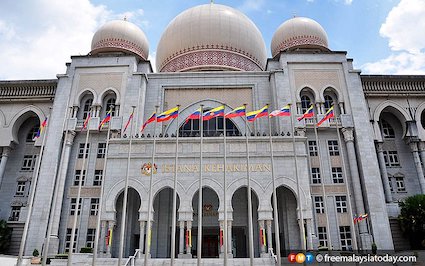
(FMT) – The Federal Court in a 8-1 majority decision today ruled that only Parliament decides on punishments for criminal offences, including the death penalty.
Chief Judge of Malaya Azahar Mohamed said since the legislature made laws for offences, it must also determine the measure of punishment for the court to impose.
“The court cannot at its own pleasure impose sentence it wished if the law does not permit,” said Azahar, who delivered the judgment.
“The power of sentencing is statutory and the court cannot exceed that in the name of exercising judicial power.”
Four appellants – P Pubalan, Peruvian national Jorge Crespo Gomes and South Africans Letitia Bosman and Benjamin William Hawkes – had challenged the constitutionality of the mandatory death penalty.
Their lawyers submitted on June 10 that judges should be given the discretion whether to impose the death sentence or jail term based on the facts and circumstances of each case.
Others in the majority were Court of Appeal president Rohana Yusuf, Chief Judge of Sabah and Sarawak Abang Iskandar Abang Hashim and judges Vernon Ong, Abdul Rahman Sebli, Zaleha Yusof Zabariah Md Yusof and Hasnah Mohammed Hashim.
Nallini Pathmanathan dissented.
Azahar said although the court could scrutinise laws passed by Parliament, it must not rush to do so on controversial issues.
“The debate on removing the mandatory death penalty is one such case. It is for Parliament to decide and the court must stay away from adjudicating moral, social and policy issues,” he said.
“Parliament is the preferable place as its members are duly elected by the people.”
He said the courts were the guardian of the Federal Constitution, adding that all the three branches of the government had their limits under the doctrine of separation of powers.
“We cherish the doctrine, otherwise the rule of law will be in chaos. We must keep the constitution in the balance,” he added.
Nallini, in her judgment, said Article 4(1) of the constitution allowed the court to scrutinise laws passed by Parliament that were inconsistent with the supreme law of the land.
“To suggest that a judge’s personal opinion may supplant that of Parliament does grave injustice to Article 4 and the judicial oath,” she said, adding that duty had to be filled as the judiciary was the arm entrusted with safeguarding the constitution.
She said the death sentence imposed for trafficking and murder was unconstitutional because the right to life and to equal protection in law was violated.
On the merit of the appeal, the majority maintained that the death sentence of Bosman and Hawkes for drug trafficking on the grounds that the trial judge did not err in law and facts.
Nallini, however, held that the case of the two should be sent back to the High Court to decide the capital punishment or jail term.
Meanwhile, Cresposo escaped the gallows but was sentenced to 10 years’ jail for possessing 779gm of cocaine at KLIA in 2013.
Pubalan, a security company proprietor, was also spared the death penalty and instead was jailed 15 years for culpable homicide not amounting to murder.
The High Court in 2016 found him guilty of the murder of his brother-in-law, D Murali.
Hisyam Teh Poh Teik represented Pubalan while Abdul Rashid Ismail appeared for the rest.
Head of prosecution in Attorney-General’s Chambers Nik Suhaimi Nik Sulaiman appeared for the prosecution.


No comments:
Post a Comment
Note: Only a member of this blog may post a comment.